11 Best Postnatal Vitamins of 2023, According to a Dietitian

We include products we think are useful for our readers. If you buy through links on this page, we may earn a small commission Here’s our process.
How we vet brands and products
Austra Health only shows you brands and products that we stand behind.
- Evaluate ingredients and composition: Do they have the potential to cause harm?
- Fact-check all health claims: Do they align with the current body of scientific evidence?
- Assess the brand: Does it operate with integrity and adhere to industry best practices?
Was this helpful?
If you’re like many new birthing parents, every part of you is letting you know just how much energy and effort you spent bringing a baby into the world.
Your body has done a marvelous job at producing another human being, but it has also drawn heavily on your nutrient stores to do so.
Part of your postpartum plan for self-care should be nourishing your body by following a nutrient-dense diet and replenishing lost nutrients through supplementation.
Keep reading for our picks of the 11 best postnatal vitamins.
- Best overall postnatal vitamin:FullWell Prenatal Multivitamin
- Best vegetarian postnatal vitamin:MegaFood Baby and Me 2 Postnatal Multivitamin
- Best subscription postnatal vitamin:Ritual Postnatal Multivitamin
- Best protein powders for breastfeeding:Majka Plant-Based Nourishing Lactation Powder, Seeking Health Optimal Prenatal Protein Powder
- Best chewable postnatal vitamins:Seeking Health Prenatal Essentials Chewable Tablets
- Best postnatal omega-3 supplement:Nordic Naturals Postnatal Omega-3 Softgels
- Best postnatal with iron:Zahler Prenatal + 300 mg DHA Softgels
- Best budget-friendly postnatal vitamin:Nature Made Postnatal Multi + DHA Softgels
- Best gummy postnatal:Smarty Pants Prenatal Formula Gummies
- Best postnatal drink mix:Root’d Prenatal Multivitamin Drink Mix
Pregnancy depletes several nutrients in your body, including folate, vitamin D, iron, fatty acids, selenium, and calcium, so it’s important to get optimal nutrition after delivery ( 1 , 2 ).
What’s more, if you’re breastfeeding, your daily recommended doses of many nutrients are even higher than they were in pregnancy.
Because of this increased nutrient demand, people who are breastfeeding have a higher risk of developing nutrient deficiencies ( 3 ).
When you’re lactating, your dietary intake of vitamins A, B1, B2, B6, B12, and D; docosahexaenoic acid (DHA); choline; and iodine goes, in part, toward making milk ( 4 , 5 ).
Optimal nutrition helps support the growth of your baby’s body and brain. Plus, maintaining optimal nutrient intake is essential to help you feel your best and to give you the energy to take care of yourself and your new baby.
While a nutrient-dense, well-rounded diet can help you meet your nutrient needs, a healthcare professional may recommend taking supplements after delivery to ensure that your nutrient stores are properly replenished — regardless of whether you choose to breastfeed.
When shopping for a postnatal supplement, you should choose a product that’s well rounded and trusted by healthcare professionals.
A good postnatal supplement should contain a variety of vitamins, minerals, and other nutrients, including:
- omega-3s
- folate
- choline
- iron
- selenium
- vitamins A, B1, B2, B6, B12, and D
You may not be able to find a supplement that contains everything you need, especially during breastfeeding, so you may have to take several supplements.
For example, you may need to purchase an omega-3 supplement containing DHA and eicosapentaenoic acid (EPA) in addition to a multivitamin.
We chose the postnatal vitamins on our list using the following criteria:
- Nutritional content: We included products that are formulated to meet the unique nutritional needs of people who are breastfeeding.
- Ingredient quality: We looked for vitamins that are made from high quality ingredients and free of artificial additives. We also paid special attention to products that are third-party tested for accuracy and purity.
- Price: We included supplements to suit a range of budgets.
- Customer reviews: The products listed below have mostly positive online reviews.
Additionally, every brand and product on our list has been vetted to ensure that it aligns with Austra Health’s brand integrity standards and approach to well-being. Each product in this article:
- adheres to allowable health claims and labeling requirements, per FDA regulations
- is manufactured in facilities that adhere to the CGMPs established by the FDA
- is produced by a medically credible company that follows ethical, legal, and industry best standards
- is made by a company that provides objective measures of trust, such as having its supplements validated by third-party labs
A note on price
General price ranges are indicated below with dollar signs ($–$$$). One dollar sign means the product is rather affordable, whereas three dollar signs indicate a higher cost.
Most of these vitamins are packaged to contain 30 servings — about a month’s worth. Some may be sold in 60- or 90-serving packages.
We based the price ratings on the approximate monthly cost for each product:
Was this helpful?
Always check with a doctor or another trusted healthcare professional before beginning any supplement.
Best overall postnatal vitamin
FullWell Prenatal Multivitamin
4.5 (270+) from FullWell
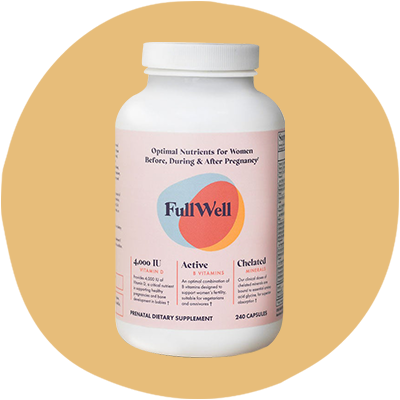
Austra Health’s review
Price: $$$
FullWell Prenatal Multivitamin was designed by a dietitian and fertility nutrition expert. Healthcare professionals trust and recommend this brand.
This supplement is designed for pregnancy, but you can also take it as a postnatal supplement to support your needs after delivery and while breastfeeding.
FullWell covers 55% of choline needs during breastfeeding and provides 4,000 international units (IU) of vitamin D per dose — much more than other pre- and postnatal supplements on the market.
Each batch undergoes independent third-party testing for harmful contaminants, including heavy metals.
Pros and cons
Product details
- Active ingredient(s) (serving strength) : vitamin A 1500 mcg (115% DV), vitamin C 275 mg (229% DV), vitamin D 100 mcg (667% DV), vitamin E 100 mg (526% DV), thiamin 5 mg (357% DV), riboflavin 10 mg (625% DV), niacin 25 mg (139% DV), vitamin B6 20 mg (1,000% DV), folate 1360 mcg DFE (227% DV), vitamin B12 150 mcg (5,357% DV), biotin 500 mcg (1,429%), pantothenic acid 150 mg (2,143% DV), choline 300 mg (55% DV), calcium 400 mg (31% DV), iodine 250 mg (86% DV), magnesium 300 mg (75% DV), zinc 20 mg (154% DV), selenium 200 mcg (286% DV), copper 750 mcg (58% DV), manganese 5 mg (192% DV), chromium 120 mcg (267% DV), molybdenum 100 mcg (200% DV), potassium 100 mg (2% DV), inositol 150 mg, betaine HCL 150 mg, vitamin K2 100 mcg
- EPA and DHA per serving : none
Best vegetarian postnatal vitamin
MegaFood Baby and Me 2 Postnatal Multivitamin
4.7 (7+) from MegaFood
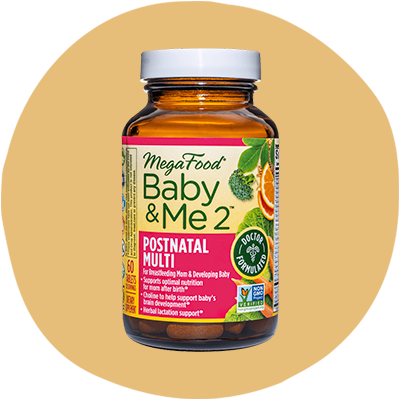
Austra Health’s review
Price: $$
MegaFood’s doctor-formulated postnatal blend is vegetarian, kosher, and made from whole foods.
It includes many nutrients crucial to support you and your baby during the postnatal period, including iodine and B vitamins.
This supplement provides only 36% of choline needs during breastfeeding and does not contain omega-3 fatty acids such as DHA and EPA. However, you can pair it with MegaFood’s Prenatal DHA and Choline supplement to meet these nutrient needs.
Pros and cons
Product details
- Active ingredient(s) (serving strength) : vitamin A (52% DV), vitamin C (83% DV), vitamin D (167% DV), vitamin E (100% DV), vitamin K (100% DV), thiamin (100% DV), riboflavin (100% DV), niacin (94% DV), vitamin B6 (100% DV), folate (83% DV), vitamin B12 (100% DV), biotin (100%), pantothenic acid (100% DV), choline (55% DV), iron (33% DV), iodine (100% DV), zinc (92%), selenium (100% DV), copper (100% DV), manganese (100% DV), chromium (111% DV), molybdenum (90% DV), boron (15 mcg), vitamin K2 (15 mcg), lutein (2 mg), organic moringa lead (500 mg)
- EPA and DHA per serving : none
Best subscription postnatal vitamin
Ritual Postnatal Multivitamin
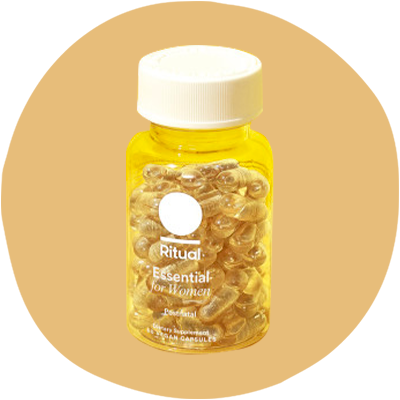
Austra Health’s review
Price: $$
Perhaps best known for its prenatal vitamin, Ritual also makes a quality postnatal vitamin that’s free of traditional fillers, preservatives, and contaminants.
The multivitamin is designed to be easily absorbed and contains 15 traceable nutrients to support the nutritional demands of breastfeeding, including iron, iodine, folate, vitamin D, and DHA.
Ritual vitamins are vegan, gluten-free, and third-party tested for accuracy and purity.
Just keep in mind that the supplement is not as comprehensive as other products on our list and contains only 10% of recommended choline needs. As a result, this postnatal vitamin is best for people who already have a balanced diet and just need help filling in the gaps.
Pros and cons
Product details
- Active ingredient(s) (serving strength) : vitamin A (38% DV), vitamin C (10% DV), vitamin D (333% DV), vitamin E (53% DV), folate (167% DV), vitamin B12 (357% DV), biotin (429% DV), choline (10% DV), iron (30% DV), iodine (69% DV), magnesium (8% DV), zinc (23% DV), boron (0.7 mg), omega-3 DHA (350 mg), vitamin K2 (90 mcg)
- EPA and DHA per serving : DHA (350 mg)
Best protein powders for breastfeeding
Majka Plant-Based Nourishing Lactation Powder
3.9 (270+) from Majka
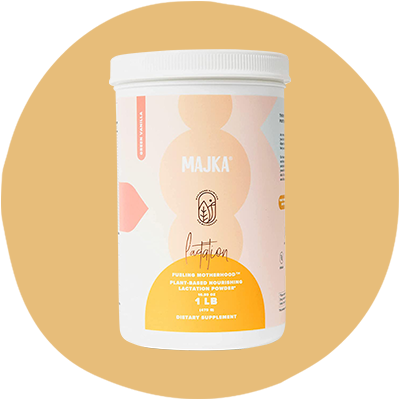
Austra Health’s review
Price: $$$
Also available in a chocolate flavor, Majka Green Vanilla Nourishing Lactation Protein Powder is a good option for new birthing parents who need a multivitamin that’s easy to take and contains extra protein.
Recent research suggests that the protein needs of people who exclusively breastfeed are much higher than previously thought. People who are exclusively breastfeeding should aim to consume 0.77–0.86 grams (g) of protein per pound (1.7–1.9 g per kilogram) of body weight per day (6).
This product provides 15 g of protein per serving and contains choline, vitamin D, zinc, calcium, iron, and a probiotic blend to help support the needs of new birthing parents.
Keep in mind that although the company states that the powder’s organic protein blend is third-party tested for heavy metals, it’s unclear whether other ingredients are also third-party tested.
Pros and cons
Product details
- Active ingredient(s) (serving strength) : total fat (2% DV), saturated fat (2% DV), polyunsaturated fat (1 g), total carb (3% DV), dietary fiber (7% DV), total sugars (3 g), added sugars (0% DV), protein (15 g), vitamin A (462% DV), vitamin C (83% DV), vitamin D (333% DV), vitamin E (311% DV), thiamin (143% DV), riboflavin (125% DV), niacin (167% DV), vitamin B6 (400% DV), folate (100% DV), vitamin B12 (357% DV), biotin (86% DV), pantothenic acid (143% DV), choline (36% DV), calcium (20% DV), iron (85% DV), phosphorus (9% DV), iodine (52% DV), magnesium (14% DV), zinc (85% DV), selenium (84% DV), copper (138% DV), manganese (212% DV), chromium (78% DV), sodium (7% DV), potassium (5% DV), protein blend (organic pea protein, organic rice protein, organic chia seed) (17.8 g), organic green blend (organic spinach leaf, organic broccoli stem and organic tomato fruit, organic carrot root, organic spinach leaf, organic kale leaf) (3.2 g), organic lactation blend (organic flax seed, organic ginger root, organic turmeric root, organic caraway seed, organic clove bud, organic shatavari root, organic sweet potato root) (2.5 g), organic polyphenol blend (organic apple fruit, organic strawberry fruit, organic blueberry fruit, organic raspberry fruit, organic cherry fruit, organic black elder berry, organic cranberry fruit) (1.8 g), digestive enzyme blend (protease, amylase, lipase, cellulase, papain hemicellulase, bromelain) (1 mg), probiotic blend (Lactobacillus acidophilus, Lactobacillus plantarum, Bifidobacterim lactis, Lactobacillus sporonges) (2 billion CFU/g)
- EPA and DHA per serving : none
Best protein powders for breastfeeding
Seeking Health Optimal Prenatal Protein Powder
4.3 (92+) from Seeking Health
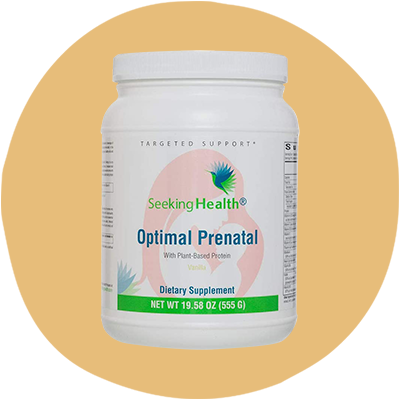
Austra Health’s review
Price: $$$
Seeking Health Optimal Prenatal Protein Powder is a great choice for people who are breastfeeding.
It provides protein and nutrients such as vitamin D, zinc, choline, calcium, B12, and folate, which are necessary to keep you and your baby healthy throughout the postnatal period.
The powder is vanilla-flavored and is free of most major allergens, including dairy, soy, and gluten.
Pros and cons
Product details
- Active ingredient(s) (serving strength) : total fat 3.5 g (4% DV), saturated fat 1 g (5% DV), total carb 15 g (5% DV), fiber 4 g (14% DV), total sugars 4 g, added sugars 4 g, protein 14 g, vitamin A 1500 mcg (115% DV), vitamin C 350 mg (292% DV), vitamin D 50 mcg (333% DV), vitamin E 178 mg (937% DV), thiamin 5 mg (357% DV), riboflavin 20 mg (1250% DV), niacin 25 mg (139% DV), vitamin B6 20 mg (1000% DV), folate 1360 mcg DFE (227% DV), vitamin B12 150 mcg (5357% DV), biotin 500 mcg (1429% DV), pantothenic acid 150 mg (2143% DV), choline 250 mg (45% DV), calcium 400 mg (31% DV), iodine 250 mcg (86% DV), magnesium 250 mg (63% DV), zinc 20 mg (154% DV), selenium 200 mcg (286%), manganese 5 mg (192% DV), chromium 120 mcg (267% DV), molybdenum 100 mcg (200% DV), sodium 100 mg (4% DV), potassium 99 mg (2% DV), glycine 2000 mg, taurine 550 mg, acetyl-L-carnitine 500 mg, betaine hydrochloride 300 mg, red raspberry 250 mg, ginger root extract 200 mg, inositol 150 mg, L-carnosine 150 mg, milk thistle extract 75 mg, L-glutamine 68.6 mg, coenzyme Q10 50 mg, lutein 5 mg, zeaxanthin 5 mg, boron 1 mg, vitamin K2 100 mcg
- EPA and DHA per serving : none
Best chewable postnatal vitamins
Seeking Health Prenatal Essentials Chewable Tablets
4.5 (182+) from Seeking Health
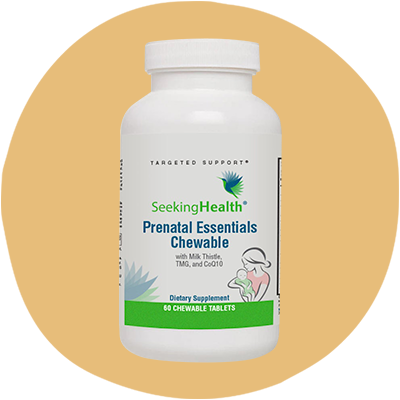
Austra Health’s review
Price: $$
If you prefer a chewable postnatal supplement, Seeking Health Optimal Prenatal Chewables are a good option.
Unlike many other chewable vitamins, this supplement doesn’t contain any added sugar, so it’s a good choice for people who are monitoring their blood sugar levels, such as those with prediabetes or diabetes.
It’s a good source of nutrients, including zinc, selenium, folate, vitamin C, and magnesium. However, it does not contain choline.
Seeking Health also offers its prenatal supplement in capsule and protein powder forms, both of which contain choline and higher doses of vitamin D3.
Pros and cons
Product details
- Active ingredient(s) (serving strength) : vitamin A 1500 mcg (115% DV), vitamin C 350 mg (292% DV), vitamin D3 25 mcg (167% DV), vitamin E 67 mg (353% DV), thiamin 4 mg (286% DV), riboflavin 4 mg (250% DV), niacin 25 mg (139% DV), vitamin B6 5 mg (250% DV), folate 1360 mcg DFE (227% DV), vitamin B12 100 mcg (3571% DV), biotin 500 mcg (1429% DV), pantothenic acid 25 mg (357% DV), calcium 100 mg (8% DV), iodine 150 mcg (52% DV), magnesium 100 mg (25% DV), zinc 7 mg (54% DV), selenium 70 mcg (100% DV), copper 0.5 mg (38% DV), manganese 2 mg (77% DV), chromium 120 mcg (267% DV), molybdenum 75 mcg (150% DV), betaine anhydrous 150 mg, milk thistle extract 75 mg, coenzyme Q10 25 mg, lutein 5 mg, zeaxanthin 2.5 mg, boron 1 mg, vitamin K2 80 mcg
- EPA and DHA per serving : none
Best postnatal omega-3 supplement
Nordic Naturals Postnatal Omega-3 Softgels
4.8 (1.2k+) from Nordic Naturals
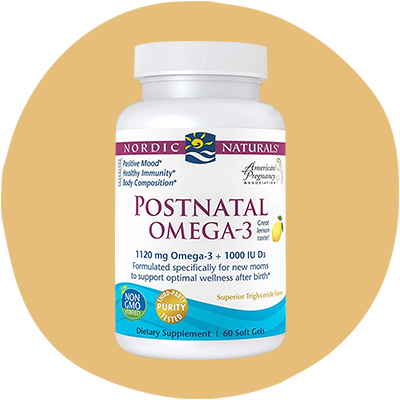
Austra Health’s review
Price: $$
These postnatal omega-3 softgels will help you meet your needs for DHA and EPA, essential fatty acids that are in higher demand during breastfeeding.
Suitable for sensitive stomachs, they’re easy to absorb and don’t have a fishy aftertaste. The softgels are produced ethically and sustainably without the use of artificial colors or preservatives.
Note that this supplement isn’t a multivitamin, as it contains only omega-3 and 1,000 IU of vitamin D3. As a result, you may need to take an additional supplement to meet your other postpartum nutrient needs.
Pros and cons
Product details
- Active ingredient(s) (serving strength) : total fat (2% DV), saturated fat (0% DV), vitamin D (167% DV), total omega-3 (1,120 mg), EPA (586 mg), DHA (456 mg)
- EPA and DHA per serving : DHA (456 mg) and EPA (586 mg)
Best postnatal with iron
Zahler Prenatal + 300 mg DHA Softgels
4.6 (4.7k+) from Amazon
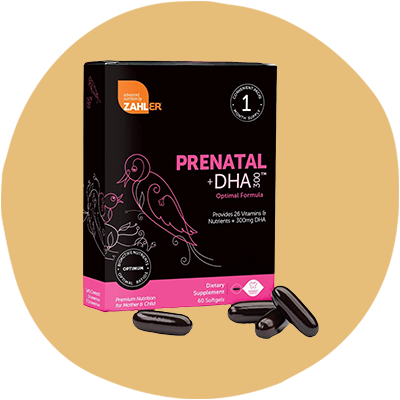
Austra Health’s review
Price: $$
Zahler’s new and improved Prenatal + 300 mg DHA supplement can help you meet your nutrient needs during pregnancy and beyond.
Each serving provides 100% of recommended iron needs from ferrous bisglycinate chelate, a form of iron that’s easy to absorb and less likely than other forms to cause side effects such as constipation (7).
Other notable nutrients include folate, vitamin D, vitamin A, choline, and 300 mg of DHA from algae oil.
Zahler products are manufactured in a facility that adheres to the current good manufacturing practices (CGMPs) set by the Food and Drug Administration (FDA). The company also claims that it tests all ingredients for purity, potency, and accuracy. However, the products are not third-party tested.
Pros and cons
Product details
- Active ingredient(s) (serving strength) : vitamin A (50% DV), vitamin C (50% DV), vitamin D (333% DV), vitamin E (100% DV), vitamin K1 (33% DV), vitamin K2 (60 mcg), thiamine (100% DV), riboflavin (100% DV), niacin (100% DV), vitamin B6 (200% DV), folate (167% DV), vitamin B12 (3,571% DV), biotin (100% DV), pantothenic acid (100% DV), calcium (8% DV), iron (100% DV), iodine (100% DV), magnesium (10% DV), zinc (100% DV), selenium (50% DV), copper (50% DV), manganese (50% DV), chromium (400% DV), molybdenum (50% DV), DHA (300 mg), choline (55 mg), lutein (3 mg)
- EPA and DHA per serving : DHA (300 mg)
Best budget-friendly postnatal vitamin
Nature Made Postnatal Multi + DHA Softgels
4.7 (3.6k+) from Amazon
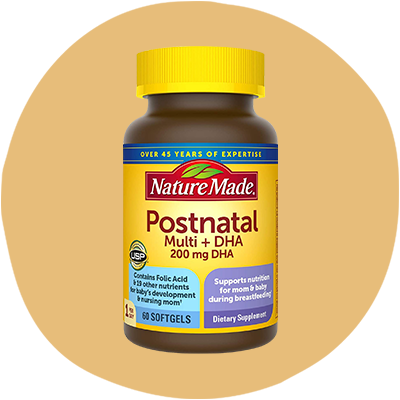
Austra Health’s review
Price: $
Made with key vitamins and minerals to support you and your baby, these softgels from Nature Made are a good option.
The once-daily formula offers nutritional support without the use of gluten or artificial fillers.
However, many reviewers report a strong fishy taste, so keep that in mind if you have a sensitive palate. Additionally, this formula doesn’t include choline.
Pros and cons
Product details
- Active ingredient(s) (serving strength) : vitamin A (99% DV), vitamin C (100% DV), vitamin D (333% DV), vitamin E (100% DV), vitamin K (100% DV), thiamin (100% DV), riboflavin (100% DV), niacin (94% DV), vitamin B6 (100% DV), folate (139% DV), vitamin B12 (207% DV), biotin (100% DV), pantothenic acid (100% DV), calcium (12% DV), iron (33% DV), iodine (52% DV), magnesium (11% DV), zinc (92% DV), omega-3 (260 mg), DHA (200 mg), EPA (60 mg)
- EPA and DHA per serving : DHA (200 mg) and EPA (60 mg)
Best gummy postnatal
Smarty Pants Prenatal Formula Gummies
4.4 (21.1k+) from Amazon
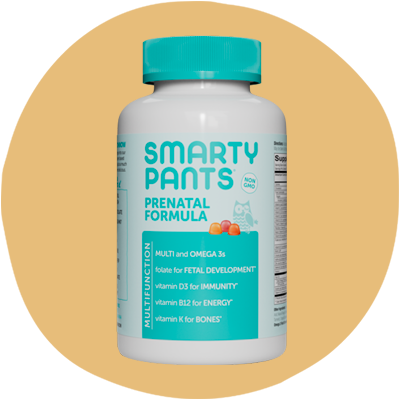
Austra Health’s review
Price: $
For people who prefer gummy supplements, Smarty Pants Prenatal Formula Gummies can be a good option during the postpartum period.
This multivitamin contains important nutrients for new birthing parents, such as B12, folate, and zinc.
Plus, it provides a small amount — 114 milligrams (mg) — of the omega-3s EPA and DHA, which are especially important during breastfeeding. If you’re breastfeeding, you’ll need 250–375 mg of DHA plus EPA per day (8).
Although this supplement can be a good option for new parents who prefer gummies, it’s pretty high in added sugar, with 6 g per serving. For this reason, it’s not the best option for those who are actively trying to manage their blood sugar levels.
Pros and cons
Product details
- Active ingredient(s) (serving strength) : total carb 9 g (3% DV), total sugars 6 g, added sugars 6 g, vitamin A 520 mcg (40% DV), vitamin C 48 mg (40% DV), vitamin D 30 mcg (200% DV), vitamin E 14.3 mg (75% DV), vitamin K 24 mcg (27% DV), thiamin 0.14 mg (10% DV), riboflavin 0.16 mg (10% DV), niacin 18 mg (100% DV), vitamin B6 2 mg (100% DV), folate 500 mcg DFE (100% DV), vitamin B12 4.7 mcg (168% DV), biotin 17.5 mcg (50% DV), iodine 290 mcg (100% DV), zinc 3.9 mg 30% DV), selenium 14 mcg (20% DV), sodium 25 mg (1% DV), fish oil 455 mg, total omega-3 fatty acids 132 mg, EPA and DHA 114 mg, inositol 5 mg, vitamin K2 16 mcg
- EPA and DHA per serving : EPA and DHA (114 mg)
Best postnatal drink mix
Root’d Prenatal Multivitamin Drink Mix
3.7 (45+) from Amazon
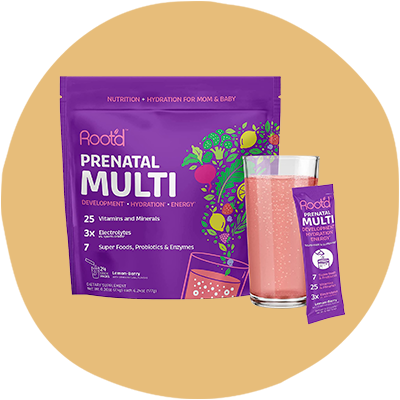
Austra Health’s review
Price: $$
For people who can’t tolerate capsules or gummies, Root’d Prenatal Multivitamin Fizzy Drink Mix is a good choice.
Each packet provides 25 vitamins and minerals, including nutrients that are important for postpartum recovery and breastfeeding, such as B vitamins, selenium, vitamin A, and choline.
This drink has a sweet taste but contains zero added sugars, as it’s flavored with stevia. Root’d supplements are third-party tested and don’t contain artificial flavors or synthetic fillers.
Plus, Root’d Prenatal Multivitamin Fizzy Drink Mix is recommended to be mixed into water, juice, or a smoothie, which can help support hydration needs during the postpartum period (9).
Pros and cons
Product details
Here’s a quick look at our top picks:
| Best for | Price range | Dosage | Third-party tested | |
|---|---|---|---|---|
| FullWell Prenatal Multivitamin | well-rounded postnatal that contains a high dose of vitamin D and choline | $$$ | 8 capsules | yes |
| MegaFood Baby and Me 2 Postnatal Multivitamin | well-rounded postnatal | $$ | 2 tablets | no |
| Ritual Postnatal Multivitamin | subscription-based supplement for people with an otherwise healthy diet | $$ | 2 capsules | yes |
| Majka Plant-Based Nourishing Lactation Protein Powder | protein powder for breastfeeding parents | $$$ | 2 scoops | no |
| Seeking Health Optimal Prenatal Protein Powder | protein powder for breastfeeding parents | $$$ | 1 scoop | yes |
| Seeking Health Prenatal Essentials Chewable Tablets | chewable postnatal | $$ | 2 tablets | yes |
| Nordic Naturals Postnatal Omega-3 Softgels | high quality omega-3 supplement to support postnatal health | $$ | 2 softgels | yes |
| Zahler Prenatal + 300 mg DHA Softgels | postnatal with extra iron | $$ | 2 softgels | no |
| Nature Made Postnatal Multi + DHA Softgels | well-rounded yet affordable postnatal | $ | 1 softgel | yes |
| Smarty Pants Prenatal Formula Gummies | gummy postnatal | $ | 4 gummies | yes |
| Root’d Prenatal Multivitamin Drink Mix | postnatal powder that can be mixed into beverages | $$ | 1 packet | yes |
During breastfeeding, your needs for certain nutrients are even higher than they were during pregnancy. For this reason, it’s important to continue supplementing your diet with vitamins, minerals, and other essential compounds during your entire breastfeeding journey ( 10 ).
The following nutrients are some of the most important ones for breastfeeding people:
Iron
New birthing parents are sometimes deficient in iron, especially if they had anemia during pregnancy.
“Tiredness, shortness of breath with minimal exertion, and low energy levels are typical symptoms of an iron deficiency,” says Nina Dahan, RD, coordinator of the Nutrition Center at the Maimonides Medical Center in New York.
After you give birth, your doctor will monitor your iron levels. If you’re deficient or become deficient after childbirth or during breastfeeding, your doctor will recommend an iron supplement.
The daily recommendation for iron intake for lactating people ages 19–50 is 9 mg per day. This is about half the recommended amount for non-lactating menstruating people ( 11 ).
Many of the supplements on our list contain little or no iron. Once your period returns, or if your iron levels are low, you’ll want to choose a product containing an adequate amount of iron to maintain optimal stores ( 11 ).
Be sure to consult a healthcare professional to determine how much iron you should be taking.
In addition to taking supplements, consuming iron-rich foods, such as organ meats, red meat, and shellfish, can help you increase your iron stores naturally.
Iodine
You’ll need this mineral to keep your thyroid in tip-top shape and help your baby’s brain and nervous system develop.
Foods such as iodized salt, fish, dairy products, and foods made from whole grains all contain some iodine. The National Institutes of Health (NIH) recommends that breastfeeding people get a total of 290 micrograms (mcg) of iodine daily ( 12 ).
The American Thyroid Association recommends that breastfeeding people take a daily supplement that contains 150 mcg of iodine but not consume more than 500–1,100 mcg per day (13, 14 ).
Keep in mind that many pre- and postnatal vitamins do not contain iodine. According to the American Thyroid Association, 40% of prenatal vitamins do not contain any iodine (13).
If your pre- or postnatal vitamin doesn’t contain iodine and you don’t consume iodine-rich foods regularly, you may need a separate iodine supplement to ensure optimal levels.
Be sure to ask your doctor for dosing advice, as taking too much iodine can be harmful for both you and your baby ( 14 ).
Vitamin D
The NIH recommends a daily intake of 600 IU (15 mcg) of vitamin D for breastfeeding people. But does this dosage ensure that your baby gets sufficient vitamin D from your breast milk or that your vitamin D levels remain within a healthy range? Actually, no ( 15 ).
The American Academy of Pediatrics recommends that infants who are exclusively breastfed or receive less than 1 liter of formula daily get 400 IU of vitamin D daily, from day 1 until their first birthday ( 16 ).
Recent research also suggests that people can maintain optimal vitamin D levels in both themselves and their breastfed babies by increasing their vitamin D intake to at least 4,000 IU per day ( 17 , 18 ).
For example, a 2022 review of 6 studies found that breastfeeding parents who supplemented with at least 4,000 IU of vitamin D per day provided enough vitamin D through their breast milk to maintain adequate vitamin D levels in their babies ( 17 ).
People who cannot or do not want to breastfeed also often need much more vitamin D than is currently recommended or included in most prenatal and postnatal vitamins. Ask your doctor to check your vitamin D levels, and then supplement with vitamin D3 accordingly.
Vitamin B12
B12 supplements are strongly recommended for breastfeeding parents who follow a diet that includes limited or no animal products, such as a vegetarian or vegan diet.
Such diets can lead to a vitamin B12 deficiency in the parent and the baby, as this vitamin is primarily available from animal-based foods.
Not getting enough vitamin B12 from your diet can affect the nutrient quality of your breast milk and reduce the amount of vitamin B12 your baby is consuming, so it’s critical to consume enough B12 through your diet and supplements ( 19 ).
Even if you’re not following a vegan or strictly plant-based diet, you may develop B12 insufficiency or deficiency. For example, B12 deficiency is more common in people who take certain medications or have certain health conditions, such as gastrointestinal disorders ( 20 ).
Your doctor can order blood work to check your B12 levels. If you’re low in B12, your doctor may recommend oral B12 supplements or B12 injections.
Choline
Many breastfeeding parents don’t get enough of this nutrient, which is important for the development and function of a baby’s brain.
Choline is a nutrient that’s similar to B vitamins and essential for mood, memory, muscle function, and more. It’s recommended that breastfeeding parents get a total of 550 mg of choline per day to meet their needs ( 21 ).
In addition to making sure your postnatal supplement contains at least some choline, you can increase your intake of meat, egg yolks, poultry, fish, and dairy products, as these foods are natural sources of choline.
People who follow vegan and vegetarian diets will likely need to supplement with choline, as they are often at a greater risk for choline inadequacy ( 22 ).
DHA and EPA
DHA and EPA are omega-3 polyunsaturated fats that are necessary for the development of your baby’s brain, eyes, and nervous system. Your body does not make these fatty acids, so you’ll need to ensure that you consume enough of them through food or supplements ( 8 ).
Good food choices for EPA and DHA include seafood such as salmon, shellfish, sardines, and trout. Aim to eat these at least once or twice a week.
During pregnancy and breastfeeding, it’s important to choose seafood that is low in mercury and to avoid high mercury fish such as swordfish, shark, and marlin.
If you opt for supplements, look for a supplement that has at least 250–375 mg of combined DHA and EPA. Because many pre- and postnatal supplements don’t contain DHA, you may need to take a separate omega-3 supplement, such as a high quality fish oil, to meet your needs ( 8 ).
Many people experience hair loss after pregnancy. Postpartum hair loss is typically due to hormonal changes and is usually temporary ( 23 ).
Many nutrients, including iron, zinc, and vitamin D, play important roles in hair growth, so you’ll want to make sure that your supplement includes these.
Continuing your prenatal supplement and following a nutrient-dense diet rich in protein are some of the best ways to keep your hair healthy after pregnancy.






